Fancy Chicken Black and White Chicken Clip at
Wikipedia list article

Thirty-nine varieties of chicken (and one Guinea Fowl).
There are hundreds of chicken breeds in existence.[1] Domesticated for thousands of years, distinguishable breeds of chicken have been present since the combined factors of geographical isolation and selection for desired characteristics created regional types with distinct physical and behavioral traits passed on to their offspring.
The physical traits used to distinguish chicken breeds are size, plumage color, comb type, skin color, number of toes, amount of feathering, egg color, and place of origin.[1] They are also roughly divided by primary use, whether for eggs, meat, or ornamental purposes, and with some considered to be dual-purpose.[1]

Difference between the sizes of Brahma and Bantam roosters
In the 21st century, chickens are frequently bred according to predetermined breed standards set down by governing organizations. The first of such standards was the British Poultry Standard, which is still in publication today.[2] [3] Other standards include the Standard of Perfection, the Australian Poultry Standard, and the standard of the American Bantam Association, which deals exclusively with bantam fowl.[3] Only some of the known breeds are included in these publications, and only those breeds are eligible to be shown competitively. There are additionally a few hybrid strains which are common in the poultry world, especially in large poultry farms. These types are first generation crosses of true breeds. Hybrids do not reliably pass on their features to their offspring, but are highly valued for their producing abilities.[1]
| Table of contents |
|---|
| By place of origin: Afghanistan • Albania • Australia • Austria • Belgium • Brazil • Bulgaria • Canada • Chile • China • Croatia • Cuba • Czech Republic • Egypt • Finland • France • Germany • Greece • Iceland • India • Indonesia • Iran • Italy • Japan • Korea • Kosovo • Malaysia • Myanmar • Netherlands • Norway • Pakistan • Philippines • Poland • Portugal • Romania • Russia • Serbia • Slovakia • Slovenia • South Africa • Spain • Sweden • Switzerland • Thailand • Turkey • Ukraine • United Kingdom • United States • Vietnam |
| By primary use: Eggs • Meat • Dual-purpose • Exhibition |
| Other: Bantams • Hybrids |
| See also •Footnotes •References |
By place of origin [edit]
Afghanistan [edit]
Albania [edit]
Australia [edit]
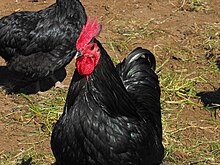
The Australorp, an Australian breed
Austria [edit]
Belgium [edit]

The d'Everberg, a Belgian ornamental bantam
Brazil [edit]
- Índio Gigante
Bulgaria [edit]

Canada [edit]
Chile [edit]
- Araucana
China [edit]

Croatia [edit]
- Hrvatica (Croatian Hen, Kokoš Hrvatica)[8] [9]
Cuba [edit]

- Cubalaya
Cyprus [edit]
- Cypriot chicken
Czech Republic [edit]
Egypt [edit]
Finland [edit]
France [edit]

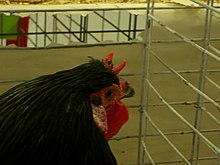

Germany [edit]

The oldest German breed, the Bergische Kräher (Historical illustration by Jean Bungartz, 1885)

The longtailed Phoenix, a German breed derived from the Japanese Onagadori

Large breeds [edit]
Bantams [edit]
|
|
Greece [edit]
Iceland [edit]
- Icelandic chicken
India [edit]

The Aseel, a fighting breed
Indonesia [edit]
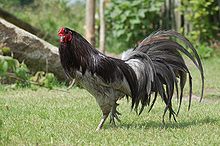
Iran [edit]
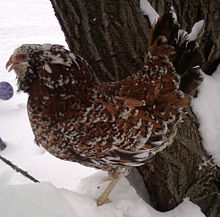
The Orloff, an Iranian breed
- Black Azerbaijan _ Marandi
Italy [edit]

Japan [edit]
Korea [edit]
- Jangmigye
Kosovo [edit]
- Kosova Long-crowing[29] [30]
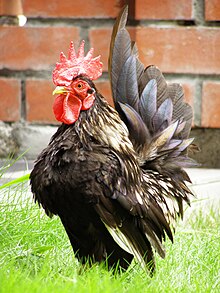
Malaysia [edit]
- Kampung
- Malay
- Serama
Marianas [edit]
- Saipan Jungle Fowl
Myanmar [edit]
- Burmese
- Pama Game
Netherlands [edit]

Norway [edit]
- Norwegian Jærhøne
Pakistan [edit]
Philippines [edit]
- Banaba[32] [33]
- Bolinao[32] [33]
- Camarines[32] [33]
- Darag[32] [33]
- Paraoakan or Parawakan[32] [33]
Poland [edit]
- Polbar[4]
- Zielononóżka Kuropatwiana (Green-legged Partridge)[4]
- Polish chicken
Portugal [edit]
Romania [edit]


- Transylvanian Naked-neck
Russia [edit]
Serbia [edit]
Slovakia [edit]
- Oravka[4]
Slovenia [edit]
South Africa [edit]
Spain [edit]
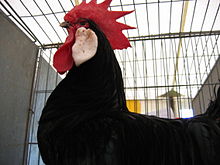

A Cantabrian Pedresa rooster without tail feathers
Sweden [edit]
Switzerland [edit]

The Appenzeller, a rare Swiss crested breed
Thailand [edit]
- Gai Chon[44]
- Gai Puen Muang[44]
- Pradu Hang Dum[44] or Pradu Hang Dam Chiangmai[45]
- Thai Game[46] : 296
Turkey [edit]
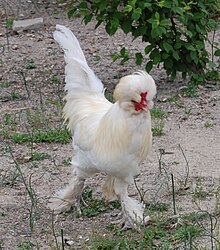
The Sultan, a Turkish breed
- Abaza[4]
- Denizli[4] [47]
- Gerze[4]
- Hacikadin[4]
- Sultan
Ukraine [edit]
- Poltava
United Kingdom [edit]

United States of America [edit]
Vietnam [edit]
|
|
By primary use [edit]
All chickens lay eggs, have edible meat, and possess a unique appearance. However, distinct breeds are the result of selective breeding to emphasize certain traits. Any breed may be used for general agricultural purposes, and all breeds are shown to some degree. But each chicken breed is known for a primary use.
Eggs [edit]
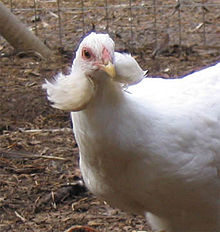
Many breeds were selected and are used primarily for producing eggs, these are mostly light-weight birds whose hens do not go broody often.
Meat [edit]
Most farms and homesteads use dual-purpose breeds for meat production. Some breeds are raised mainly for meat:
Dual-purpose [edit]
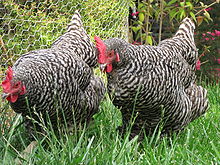
Barred Plymouth Rock, a dual-purpose breed
The generalist breeds used in barnyards worldwide are adaptable utility birds good at producing both meat and eggs. Though some may be slightly better for one of these purposes, they are usually called dual-purpose breeds.
Exhibition [edit]
Since the 19th century, poultry fancy, the breeding and competitive exhibition of poultry as a hobby, has grown to be a huge influence on chicken breeds. Many breeds have always been kept for ornamental purposes, and others have been shifted from their original use to become first and foremost exhibition fowl, even if they may retain some inherent utility. Since the sport of cockfighting has been outlawed in the developed world, most breeds first developed for this purpose, called game fowl, are now seen principally in the show ring rather than the cock pit as fighting cocks.
| Key |
|---|
| U denotes a breed primarily used for exhibition, but which is still used for utility purposes. |
| G denotes a game breed. |
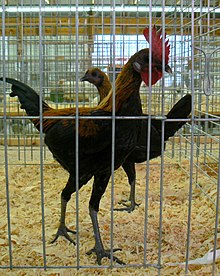
Bantams [edit]

Most large chicken breeds have a bantam counterpart, sometimes referred to as a miniature. Miniatures are usually one-fifth to one-quarter the size of the standard breed, but they are expected to exhibit all of the standard breed's characteristics. A true bantam has no large counterpart, and is naturally small. The true bantams include:
Crossbreeds [edit]
Many common strains of crossbred chickens exist, but none breed true or are recognized by poultry breed standards; thus, though they are extremely common in flocks focusing on high productivity, crossbreeds do not technically meet the definition of a breed. Most crossbreed strains are sex linked, allowing for easy chick sexing.
See also [edit]
- List of birds
- List of duck breeds
- List of goose breeds
- List of turkey breeds
- Chickens as pets
Footnotes [edit]
- ^ a b c d (Ekarius 2007, p. 23) harv error: no target: CITEREFEkarius2007 (help)
- ^ a b (Ekarius 2007) harv error: no target: CITEREFEkarius2007 (help)
- ^ a b (Heinrichs 2007)
- ^ a b c d e f g h i j k l m n o p q r s t u v w x y z aa ab ac ad ae af ag ah ai aj ak al am an ao ap aq ar as at au av aw ax ay az ba bb bc bd be bf bg bh bi bj bk bl bm bn bo bp bq br bs bt bu bv bw bx by bz ca cb cc cd ce cf cg ch ci cj ck cl cm cn co cp cq cr cs ct cu cv cw cx cy cz da db dc dd de df dg dh di dj dk dl dm dn do dp dq dr ds dt du dv dw dx dy dz ea eb ec ed ee ef eg eh ei ej ek el em Domestic Animal Diversity Information System. Food and Agriculture Organization of the United Nations. Accessed January 2012.
- ^ "Altsteirer". Feathersite.com. Accessed January 2012.
- ^ a b c d e f g h i j k l m n o p Grandes volailles Archived 2018-09-23 at the Wayback Machine (in French) Association pour la Promotion des Animaux de Basse-cour Belges. Accessed January 2012. "Large poultry breeds"
- ^ a b c d e f g h i j k l m n o p q r s t Volailles naines Archived 2018-09-23 at the Wayback Machine (in French) Association pour la Promotion des Animaux de Basse-cour Belges. Accessed January 2012. "Dwarf poultry breeds"
- ^ "Croatian Hen". Feathersite.com. Accessed January 2012.
- ^ http://www.rfp-europe.org/fileadmin/SITE_ERFP/country_reports/Crotia/CR_Croatia_2009.pdf
- ^ "Archived copy" (PDF). Archived from the original (PDF) on 2014-05-25. Retrieved 2012-08-12 . CS1 maint: archived copy as title (link)
- ^ "Biodiversity in the CR/animals genetic resources". Enrin.grida.no. Accessed January 2012.
- ^ a b "Czech chicken breeds". Accessed January 2012.
- ^ a b c d e f g h i j k l m Nikkonen, Terhi (2011) Finnish AnGR conservation programme: What and how? MTT Agrifood Research Finland. Accessed January 2012.
- ^ "Finnish Chickens". Feathersite.com. Accessed January 2012.
- ^ "Finnish National Animal Genetic Resources Program / Each country's work / Nordic conservation work / InnehĂĽll / Farm Animals / NordGens webbplats - Nordic Genetic Resource Center". Nordgen.org. Archived from the original on 2012-01-22. Accessed January 2012.
- ^ a b c d e f g h i j k l m n o p q r s t u v w x y z aa ab ac ad ae af ag ah ai aj ak al am an ao French fowl Archived 2016-03-05 at the Wayback Machine Fédération française des volailles. Accessed January 2012.
- ^ a b c d e f g h i j k l m n o p q r s t u v w Hühner 2011 Archived 2016-03-05 at the Wayback Machine (in German) Bund Deutscher Rassegeflügelzüchter e.V. Accessed January 2012. "Chickens 2011"
- ^ a b c d e f g h i j k l m n o p q r s t u v w x y z aa ab ac ad ae af ag ah ai aj ak al am an ao ap aq ar as at au av aw ax ay az ba bb bc bd be bf bg bh bi bj bk bl bm bn bo bp bq br bs bt bu bv bw bx by bz ca cb cc cd ce Listing of European Poultry Breeds and Colours, 2013 Archived 2013-06-16 at the Wayback Machine, entente-ee.com
- ^ a b c d e f g h i j k l m n o p q r s t u v w x y z aa ab ac ad ae af ag ah ai aj ak al am an ao ap aq ar as at au Zwerghühner 2011 Archived 2016-03-21 at the Wayback Machine (in German) Bund Deutscher Rassegeflügelzüchter e.V. Accessed January 2012. "Dwarf chickens 2011"
- ^ "Arca-Net". Arca-net.info. Accessed January 2012.
- ^ "Arca-Net". Arca-net.info. Accessed January 2012.
- ^ "Arca-Net". Arca-net.info. Accessed January 2012.
- ^ "Arca-Net". Arca-net.info. Accessed January 2012.
- ^ "Arca-Net". Arca-net.info. Accessed January 2012.
- ^ "Arca-Net". Arca-net.info. Accessed January 2012.
- ^ "Arca-Net". Arca-net.info. Accessed January 2012.
- ^ (Percy 2006, p. 17)
- ^ a b c d e f g h i j k l m n o p q r s t u Atlante delle razze * di polli (in Italian) Accessed January 2012. "Atlas of chicken breeds"
- ^ "Kosova Long Crowing Rooster". Retrieved 18 July 2012.
- ^ Tringjyrshet Kosov
- ^ a b c d e f g h i j k l m n o p q r s t Hoenders en dwerghoenders Archived 2007-07-17 at the Wayback Machine (in Dutch) Nederlandse Bond van Hoender, Dwerghoender, Sier- en Watervogelhouders. Accessed January 2012. "Chickens and dwarf chickens".
- ^ a b c d e Breeds reported by Philippines: Chicken. Domestic Animal Diversity Information System of the Food and Agriculture Organization of the United Nations. Accessed June 2014.
- ^ a b c d e Feleciano R. Bejar, Manuel J. Baylon, Jaime B. Fabillar, Lagrito Ebert B. Mante, Arturo A. Ultra, Reynaldo R. Aquino, Elvie T. Bejar (2012). Management Practices and Morphological Characterization of Indigenous (Native) Chickens in Samar Province Archived 2014-06-15 at archive.today. Southeast Asian Regional Center for Graduate Study and Research in Agriculture: Agriculture & Development Discussion Paper Series No. 2012-3.
- ^ a b c d Aves Archived 2012-01-21 at the Wayback Machine (in Portuguese) Associação dos Criadores de Bovinos de Raça Barrosã. Accessed January 2012. "Birds"
- ^ Banatski gološijan standard Archived 2013-02-01 at the Wayback Machine (in Serbian) Udruzenje za zastitu i odgoj sitnih zivotinja Sremska Mitrovica. Accessed January 2012.
- ^ Svrljig Kokos Balkan Network for Agrobiodiversity. Accessed January 2012.
- ^ a b c d Slovenske avtohtone in tradicionalne pasme domačih živali (2014). Oddelek za zootehniko, UL BF (in Slovenian). Retrieved 22.10.2021.
- ^ Holcman, Antonija. "Poultry Breeds -Styrian Chickens — Breeds of Livestock, Department of Animal Science". afs.okstate.edu . Retrieved 2021-10-22 .
- ^ a b c Strelec, Alenka; Terčič, Dušan; Malovrh, Špela; Holcman, Antonija (2009). "Prireja in fizikalne lastnosti jajc slovenskih tradicionalnih pasem kokoši lahkega tipa". Acta agriculturae Slovenica (in Slovenian). 1: 5–12.
- ^ Kobold, Primož (2017). "Primerjava proizvodnosti piščancev ross 308 in slovensko pozno operjene kokoši v pogojih ekološke reje". dk.um.si (in Slovenian). Retrieved 2021-12-05 .
- ^ a b c Agricultural Research Council - The indigenous poultry breeds of SA Archived 2011-09-28 at the Wayback Machine
- ^ a b c d e f g h i j k l Ganaderia: Catálogo Oficial de Razas de Ganado de España Archived 2012-02-02 at the Wayback Machine (in Spanish) Ministerio de Medio Ambiente y Medio Rural y Marino. Accessed January 2012 (click Razas, then Catálogo Oficial de razas). "Breeding: official catalogue of agricultural breeds in Spain".
- ^ Asociacion Cántabra para la Conservación y Fomento de la Gallina Pedresa.
- ^ a b c Breeds reported by Thailand: Chicken. Domestic Animal Diversity Information System of the Food and Agriculture Organization of the United Nations. Accessed June 2016.
- ^ "Pradu Hang Dam Chiangmai". Poultry Research and Development Section, Bureau of Animal Husbandry and Genetic Improvement, Department of Livestock Development, Thailand. Archived from the original on 2014-01-08. Retrieved 2014-01-08 .
- ^ Victoria Roberts (2008). British poultry standards: complete specifications and judging points of all standardized breeds and varieties of poultry as compiled by the specialist breed clubs and recognised by the Poultry Club of Great Britain. Oxford: Blackwell. ISBN 9781405156424.
- ^ "Denizli Rooster". Kultur.Gov.Tr. Department of Culture and Tourism, Republic of Turkey. Retrieved 16 June 2014.
References [edit]
- Carol Ekarius (2007). Storey's Illustrated Guide to Poultry Breeds. North Adams, Massachusetts: Storey Publishing. ISBN 9781580176675.
- Heinrichs, Christine (2007). How To Raise Chickens . Voyageur Press. ISBN978-0-7938-0601-0.
- Percy, Pam (2006). The Field Guide to Chickens. Suite 200, 380 Jackson St, St Paul MN 55101: Voyageur Press. ISBN0-7603-2473-5. CS1 maint: location (link)
Fancy Chicken Black and White Chicken Clip at
Source: https://en.wikipedia.org/wiki/List_of_chicken_breeds
0 Response to "Fancy Chicken Black and White Chicken Clip at"
Post a Comment